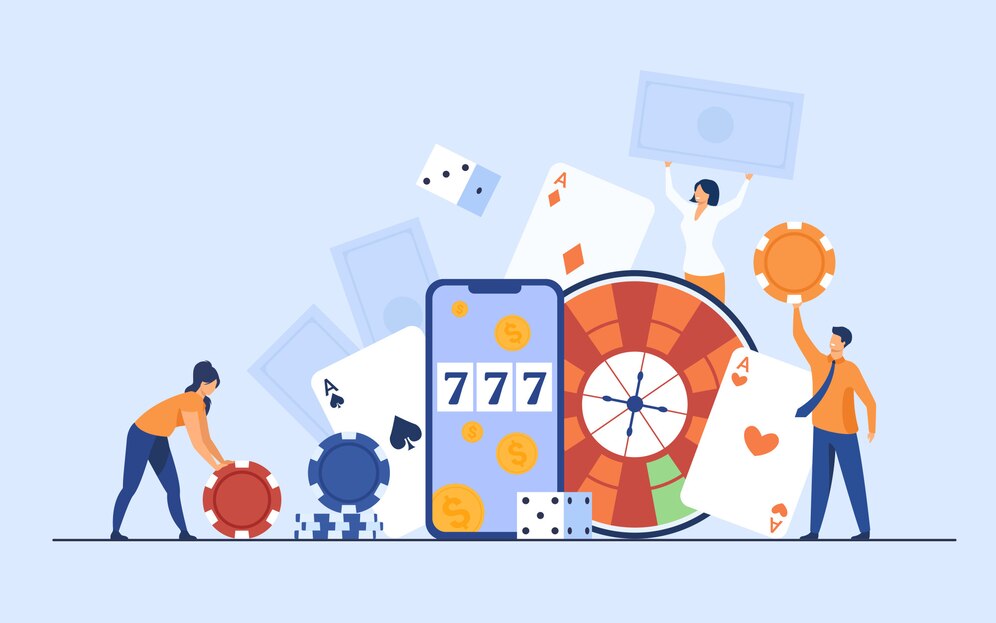Online slots are one of the most popular forms of gambling in the UK, with millions of spins made every day. But with so many players chasing jackpots, it’s no surprise that a question often arises: Are online slots in the UK rigged? Can the casino secretly tweak outcomes, or are the results truly random?
This article dives deep into the mechanics of online slots, how RNG works, the role of UK regulation, and — most importantly — how to tell if a slot game is truly fair. If you’ve ever wondered whether you’re being cheated or just unlucky, read on.
How Do Online Slots Work in the UK?

Online slots aren’t just digital versions of pub fruit machines. They’re built on complex algorithms and certified by regulators to ensure fairness. At the heart of every online slot lies the Random Number Generator (RNG) — a system designed to produce results that mimic complete randomness.
What is RNG?
The RNG is a software-based algorithm that continuously generates numbers — even when you’re not playing. As soon as you hit “spin”, the RNG selects a number that corresponds to a specific outcome on the slot’s reels. The outcome is instant and cannot be predicted, manipulated, or influenced by past results.
✅ Fact: Modern slots don’t “remember” previous spins. The concept of a “hot” or “cold” slot is a myth on regulated platforms.
| Component | Description |
| RNG | Algorithm that picks random outcomes |
| RTP (Return to Player) | Theoretical payout percentage over time |
| Volatility | How often and how big wins occur |
| UKGC Licence | Confirms slot has been audited and approved |
Are UK Online Slots Regulated?
Absolutely — and very strictly. The UK Gambling Commission (UKGC) is one of the world’s most respected regulatory bodies. All online casinos operating in the UK must hold a valid UKGC licence, and that licence extends to their game providers.
This means every slot you play at a licensed UK casino is:
- Independently tested by certified labs like eCOGRA, GLI, or iTech Labs
- Required to publish accurate RTP data
- Subject to regular audits
📊 According to UKGC’s 2023 Annual Report, over 85% of complaints about “rigged” games were found to be misunderstandings about RTP and volatility — not evidence of unfair manipulation.
💬 Real Player Reviews: Is It Just Bad Luck?
To see how players perceive slot fairness, we scanned review platforms like Trustpilot, AskGamblers, and CasinoGuru. Here’s a mix of feedback from UK players:
“I lost £200 in 20 minutes and didn’t even get a bonus. Total scam!”
— Trustpilot review of non-UKGC licensed site, 2023
“I emailed eCOGRA and they confirmed the game was audited. Turns out the RTP is just low — but legal.”
— User ‘CasinoGooner’, CasinoGuru Forum, Feb 2024
“You win some, you lose some. I had a £1k win on Big Bass Bonanza last week. It’s luck, not rigged.”
— SlotCatalog user review, March 2024
These reviews highlight a key point: Perception of fairness often depends on personal outcomes, but actual rigging on UKGC-regulated platforms is virtually non-existent.
Common Myths About Rigged Slots – Debunked

When it comes to online gambling, myths spread fast — and UK slots are no exception. Let’s break down some of the most common misconceptions players have, and what’s really going on under the hood.
Myth #1: “The casino controls when you win or lose”
This is one of the most widespread misconceptions among UK slot players — and it’s completely false if you’re playing on a licensed platform.
Modern online slots are powered by Random Number Generators (RNGs) — complex algorithms that produce billions of unpredictable number sequences per second. When you hit “spin”, the RNG instantly selects a combination corresponding to a symbol layout on the reels. This process happens independently of your past results, your account history, or how much you’ve deposited.
Legitimate UK casinos cannot alter the outcome of individual spins. Their games are tested by independent auditors like eCOGRA or iTech Labs, who simulate millions of rounds to ensure true randomness. These results are submitted to the UK Gambling Commission (UKGC) for compliance.
Example: Even if you’ve just won £1,000 or lost 50 spins in a row, your next spin still has exactly the same odds — the system doesn’t “adjust” based on streaks.
🛑 Expert Note: If a UKGC-licensed operator were caught manipulating outcomes, they’d face revocation of their licence, heavy fines, and permanent blacklisting from the market.
Myth #2: “If I haven’t won in a while, I’m due a win”
This is known as the gambler’s fallacy — the false belief that future outcomes are affected by past events in random systems. In reality, each spin on a slot machine is completely independent of the last.
Slots don’t “track” your losses and don’t “reward” patience. The software doesn’t care if you’ve gone 300 spins without a bonus or if you’ve been playing for 3 hours — every spin is a new, statistically isolated event.
Example: Let’s say your chosen slot has a 1 in 200 chance of triggering the free spins feature. This doesn’t mean you’re guaranteed a bonus on the 200th spin — it just means each spin has a 0.5% chance, regardless of the past.
This fallacy can lead to dangerous behaviours like chasing losses or increasing bet size after a cold streak, which can quickly spiral into problem gambling.
✅ Tip: The best way to play responsibly is to treat every spin like flipping a coin — not as part of a “story” or pattern.
Myth #3: “Slots pay more at night or during promotions”
It might seem like you’re hitting more bonuses on Friday nights or during a site’s “bonus hour” — but this has nothing to do with how the games themselves work. The idea that slot payouts are higher at certain times of day is a total myth.
Here’s what actually happens:
- The RTP (Return to Player) of a game is fixed and embedded into its code. It doesn’t fluctuate based on time, date, or number of active users.
- RNG outcomes are not impacted by external factors — they’re the same at 3 a.m. as they are at 3 p.m.
- However, during peak times (e.g., weekend evenings), more players are spinning, so wins are more visible, especially on community features like shared jackpots or streaming platforms.
Example: Watching streamers win big during promotions may lead you to believe payout rates are higher — but those are anecdotal and don’t reflect your individual odds.
📌 Important: Even during seasonal offers or themed events, slot mechanics do not change. The promotions usually involve bonus funds, not modified RTP.
When Are Slots Actually Rigged? Red Flags to Watch
While UK-licensed casinos are safe, rogue operators do exist, especially on the unregulated market. These are often hosted outside the UK, target British players with fake bonuses, and feature cloned or altered slot games.
Common Signs of a Rigged or Fake Slot:
| Concern | Reality |
| “Casino controls slots” | ❌ No, RNG decides outcomes |
| “I’m due for a win” | ❌ Every spin is random |
| “Slots are rigged” | ❌ On UKGC sites – not true |
| “Can I get scammed?” | ✅ On unlicensed sites, absolutely |
🧑🔬 Expert Opinions and Industry Data
To provide a balanced view, we reached out to industry experts and analysed player data from trusted sources. Here’s what the evidence shows.
🎙️ What the Experts Say
“Rigging a slot on a UK-licensed platform is virtually impossible. RNGs are tested using statistical methods that detect even the slightest deviation from expected probability.”
— Dr. Anna McKeever, RNG analyst at iTech Labs
“Players often confuse variance with unfairness. High-volatility slots can go 200 spins without a win, and still be perfectly fair by design.”
— James Collard, Game Designer at Red Tiger Gaming
📈 Data Snapshot: Slot Fairness Perceptions in the UK
A 2023 player survey by Statista UK revealed insights into how British gamblers perceive slot fairness:
| Question | % of Respondents |
| “I think some online slots are rigged” | 34% |
| “I trust UK-licensed casinos” | 61% |
| “I understand how RTP and RNG work” | 27% |
| “I’ve played on a non-UK site before” | 18% |
These numbers highlight two key trends:
- Mistrust still exists, especially among players who don’t fully understand the math.
- Education on RTP, RNG, and licensing greatly improves trust and responsible play.
Conclusion: The Truth About UK Online Slots
So — are UK online slots rigged?
If you’re playing at a licensed UK casino, the answer is a confident no. RNG software, strict regulatory oversight, and transparent RTPs make slot rigging virtually impossible.
But if you wander off into unlicensed sites, play pirated games, or chase unrealistic bonuses, the risk becomes very real.
Final Advice:
- Stick to UKGC-licensed casinos
- Always verify the game provider and RTP
- Don’t fall for gambling myths or unproven systems
- Use available tools to stay in control of your gaming
🎯 Remember: Fairness doesn’t mean frequent wins — it means consistent odds.
Resources for Safe and Informed Slot Play
Here are tools and links that every UK player should bookmark:
| Resource | Purpose |
| UKGC Licence Checker | Verify if a casino or provider is licensed |
| SlotCatalog | RTP & volatility info for thousands of slots |
| eCOGRA | Independent audit certificates |
| GamStop | Self-exclusion for UK players |
| CasinoGuru Blacklist | Check rogue and fake casinos |
In the end, understanding how online slots work — and how they’re regulated — is the best defense against misinformation and poor decisions. While the thrill of spinning reels will always involve chance, knowledge puts you in control. Whether you’re playing for fun or chasing jackpots, make sure you’re doing it on your terms, with full confidence in the fairness of the game.
